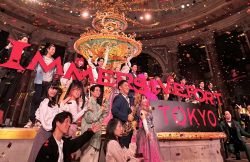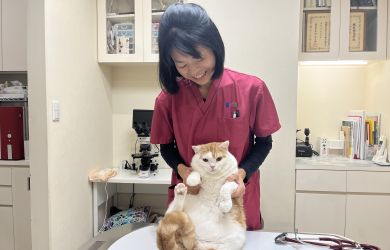
Originally published on metropolis.co.jp on February 2011
You’ve seen the billboards all over town, bare text on a plain blue background: KEN. The man behind that simple advert, Ken Tanaka, has an equally simple motto: “Customer satisfaction first, our profit later.” As the founder and president of real estate giant Ken Corporation, the 71-year-old has certainly hit on a winning formula—he presides over a diversifying, foreigner-friendly company that oversees more than 10,000 properties. Metropolis recently sat down with the self-made mogul at his office in Roppongi.

Photo by Lorenzo Barassi
Give us an outline of your business.
Ken Corporation provides accommodation and housing for people in fields ranging from finance to government to diplomacy. We specialize in working successfully with foreigners—60 percent of our client base is foreign. Our target customers aren’t earning ¥100,000 or ¥200,000 a month; instead, we focus on those earning ¥500,000 to ¥1.5 million a month.
Due to the recession, our properties have dropped in price by about 20 percent, but foreign people in the banking and brokering industries are still eager customers. Tokyo is one of the most important metropolitan cities in the world, so foreign people come back and forth constantly. I don’t see the foreign resident population decreasing. In fact, our clients are increasing in spite of the recession.
We have a special department dealing with about 12,000 properties, including public and high-end. Then we have another company that acts as a guarantor for foreigners negotiating with Japanese landlords. It’s like an insurance company. Foreign residents need to have a guarantor in Japan for renting property. Most foreigners don’t have someone to assist in this way, so we help them instead.
We also buy properties. Being in the business for 30-40 years, people come to us openly to sell their property. We don’t compete in the lower end of the market. Our properties sell in the hundreds of millions of yen. We sell up to ten places a month.
So I see Ken Corporation as a kind of general trading company with extremely high-end foreign and Japanese clients. Another reason why Ken Corporation’s reputation is strong is because of our hotel business. For example, Ken Corporation owns five-star hotels such as the Hilton Hotel, Sheraton Hotel, Hyatt Hotel, PIC and Hotel Nikko, all of which are located in Guam. Even though I believe the company is very popular, Ken Corporation is not listed on the stock market. I’m concerned about becoming a target for M&A, leading to stockholder discontent.
Most foreigners see Ken Corporation primarily as a real estate company…
Yes, people don’t know just how diverse our business really is. We run beauty salons, music companies and even a TV station called Shibuya Television. We have seven large media monitors in key locations around Shibuya for advertising. We also have a live house called Shibuya O-East. Up to 1,000 people come and enjoy live music performed by famous musicians. Ken Corporation is more than just a real estate company.
How did the company get its start?
I founded Ken Corporation in 1972. I had previously worked at a real estate company that specialized in dealing with foreigners. It wasn’t a very big company.
Before that, I graduated from Waseda University—actually, I graduated a year later than usual. I had a huge preoccupation with the Japanese chess game go. I was part of a team and played go far more than I studied. That’s why I flunked a year.
I wasn’t smart, but my English score was good and I enjoyed English. So I looked for a job where I could use English in business and I began working for a real estate company associated with The Japan Times. My speaking skill wasn’t good, but I didn’t need to be able to speak well just for showing rooms. There was a kind of formula for what I needed to say. I learned English and foreign culture and taught Japanese culture to foreign customers every day through my work.
Talking to customers suited my outgoing character. I worked there for a long time, five or six years. At 30, I decided that the real estate business would be where I would stay. There was no concerted effort to build the real estate empire that I have now. I simply focused on having an enjoyable job, and this is the way my life has turned out.
Success in the business is based on honesty and sincerity. Contributing to society is the key point. My father was a doctor, and the hospital where he worked was a place that took care of people who wanted to buy medicine. My father was very kind. He built friendships with his customers over a long time and people really liked him. There were those customers who couldn’t afford the medicine, but my father still provided it to them. He always assured them that they could “pay next time.” I believe I inherited his spirit. So I never want to do the wrong thing and I have a strong desire to contribute to society. As it turns out, we’ve been able to serve many customers. You know, it’s a step-by-step approach.
What’s your take on the Japanese real estate industry?
Japan’s real estate industry has experienced bubble economies a number of times. Twenty years ago was the biggest bubble, and in 1991, it burst. The real estate environment became corrupt. Many companies and banks owned lots of properties during that time. They were supposed to sell these properties when prices went up. Ken Corporation didn’t follow because I clearly saw what would happen after the bubble.
There were actually very few companies like mine that didn’t buy properties during the bubble. The price of property plummeted dramatically. The property you bought for ¥10 billion was worth ¥1 billion during the downturn. As a result, small companies fell easily into bankruptcy. But Ken Corporation stayed strong, and we developed a good reputation because of that. In addition, banks were very open to lending us money, which allowed us to buy lots of buildings and hotels. The company got rich as a result. We paid off all the debt over ten years. This enabled us to move into the big league. It was a rare case.
What is the current situation like?
Not as bad as 20 years ago, when the market dropped 90 percent. The current market is about 50 percent down. Most companies have borrowed, so it’s a serious situation. After the last bubble burst, the Japanese Real Estate Investment Trusts was established. J-REIT buys property as stock and sells it, similar to the stock market. After that, companies are able to get a rebate and the interest rate is 4 percent. It’s much better than the banks. J-REIT stopped the nightmare and rescued many companies.
How about for foreigners? Is it easy to buy properties these days?
Yes, it’s easy. Good properties have dropped 20-30 percent, so people want to change where they’re living. There are many new properties on the market, which means the level of the properties has risen. And there are some fantastic properties around now. People can rent very good properties for reasonable prices. It’s much better than before.
Given the current economic situation, do you think people should buy or rent property?
Well, I think as long as you keep your property, its value will go up, so if you can come up with the money, you should buy it. Once paid off, the property is yours. It’s comfortable to keep your own property. If you are not sure that you could pay it off in the future, you shouldn’t buy it. After you get old, you’ll get money from your property.
What does the future hold for the Japanese real estate market?
There are many attractions here in Japan. For instance, think of the beautiful mountains and rivers throughout Kyoto. We Japanese don’t notice the beauty of skiing in Hokkaido and the beaches in Okinawa. Japan’s island beauty runs north to south. Since Korean and Chinese people are becoming wealthier, they will visit Japan more and more. So we need to highlight our tourism much more. Japan has become careless about it.
What do you like to do in your spare time?
My hobby is running the company! Business is my hobby. Also, focusing on becoming number one is the point. Don’t cheat on anything else. This is my philosophy to be a winner.







